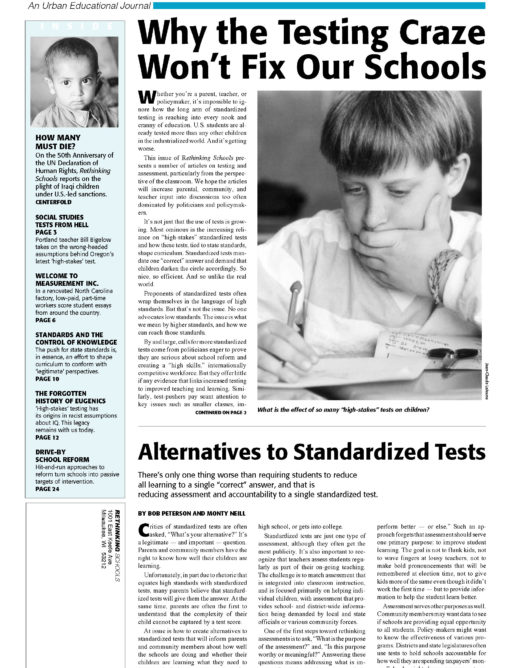Why the Testing Craze Won’t Fix Our Schools
Illustrator: Jean-Claude Lejeune
Whether you’re a parent, teacher, or policymaker, it’s impossible to ignore how the long arm of standardized testing is reaching into every nook and cranny of education. U.S. students are already tested more than any other children in the industrialized world. And it’s getting worse.
What is the effect of so many ‘high-stakes’ tests on children?
This issue of Rethinking Schools presents a number of articles on testing and assessment, particularly from the perspective of the classroom. We hope the articles will increase parental, community, and teacher input into discussions too often dominated by politicians and policymakers.
It’s not just that the use of tests is growing. Most ominous is the increasing reliance on “high-stakes” standardized tests and how these tests, tied to state standards, shape curriculum. Standardized tests mandate one “correct” answer and demand that children darken the circle accordingly. So nice, so efficient. And so unlike the real world.
Proponents of standardized tests often wrap themselves in the language of high standards. But that’s not the issue. No one advocates low standards. The issue is what we mean by higher standards, and how we can reach those standards.By and large, calls for more standardized tests come from politicians eager to prove they are serious about school reform and creating a “high skills,” internationally competitive workforce. But they offer little if any evidence that links increased testing to improved teaching and learning. Similarly, test-pushers pay scant attention to key issues such as smaller classes, improved teacher education, more time for teacher planning and collaboration, and ensuring that all schools receive adequate and equitable resources needed to boost achievement.
Rather than grappling with these issues, too many politicians have seized on a simplistic formula for reform: more standardized tests, especially “high stakes” tests. Nationwide, states and school districts are forcing a growing number of children to take “high stakes” standardized tests and, on the basis of test scores, children may be retained, denied access to a preferred high school, or, in some cases, even refused a high school diploma. That’s not public accountability, it’s discrimination.
Dating back to the development of IQ tests at the turn of the century, standardized tests have been used to sort and rank children, most reprehensibly along racial and class lines, and to rationalize giving more privileges to the already privileged. Indeed the first standardized tests were developed by eugenicists anxious for “scientific” data to prove their theories of biological determinism.
To acknowledge the sinister origins of standardized tests is not, however, to dismiss parent and community concerns about school accountability. We understand and agree with these concerns. Too many schools fail too many children, especially low-income students, students of color, and students who do not speak English as a first language. The broader community has the right and the responsibility to oversee how well schools perform. Good assessments can be one valid method of insuring accountability.
Tests Shape Curriculum
Problems with standardized tests go beyond their “high stakes” use. Standardized tests can also drive curriculum and instruction in ways that harm children. Teachers are subjected to increasing pressures to prepare students for the tests, even when we know that the tests don’t assess the most essential aspects of thinking and learning. Students often internalize the judgements of the tests — as if test scores were the final word on one’s knowledge or potential.
In addition, standardized tests come packaged with demands for more standardized curriculum — again, wrapped in the rhetoric of “standards.” These calls do not take place in a political and cultural vacuum. They are part of a broader movement to promote a narrow version of patriotism and “family values,” and to silence the critical voices of feminists, environmentalists, labor activists, and advocates of racial justice. It is also worth noting that when the right wing pushes voucher schools or charter schools, they often want these exempted from statewide high-stakes tests, so that the schools can be free to pursue their entrepreneurial “creativity.”
Analysis into Action
We hope that this special issue can help turn analysis into action. An essential first step is to expose the fallacy that “high- stakes” tests will lead to higher standards and improved academic achievement. Some groups, for instance the Local School Councils Summit in Chicago, have worked with national groups such as FairTest to produce parent-friendly information explaining the inherent problems in standardized tests.
Another important task is to promote alternative forms of assessment and accountability. Parents and the public need to know how well their children and their schools are doing. Developing more democratic forms of assessment and accountability is essential to defeating calls for standardized curriculum and testing. Educators must not box ourselves into a corner where we are perceived as opposing any form of schoolwide, districtwide, or statewide assessment and accountability. Historically, social justice activists have used such aggregate data to show how schools fail to provide a quality education to all children — to highlight schools’ “savage inequalities.”
“High-stakes” standardized tests must be resisted. Such resistance can, and is, taking many forms.
In Ohio, for instance, a “Say No” campaign is underway to let parents know they can exempt their children from the 4th, 6th, or 12th grade Ohio Proficiency Tests, which are used to determine graduation and grade advancement. In Oregon, teachers have publicly challenged the state’s standards and tests; they are developing alternatives to the Trivial Pursuit-like social studies multiple-choice tests. In Texas, the Mexican-American Legal Defense and Education Fund (MALDEF) is asking the courts to declare unconstitutional the requirement that students must pass the Texas Assessment of Academic Skills in order to graduate from high school. MALDEF is particularly concerned about the requirement’s discriminatory effect on Latino and African-American students.
We realize that this issue of Rethinking Schools only begins to touch on the many controversies surrounding standards and assessment. We hope you find it useful, and we look forward to continued discussion in future issues.

